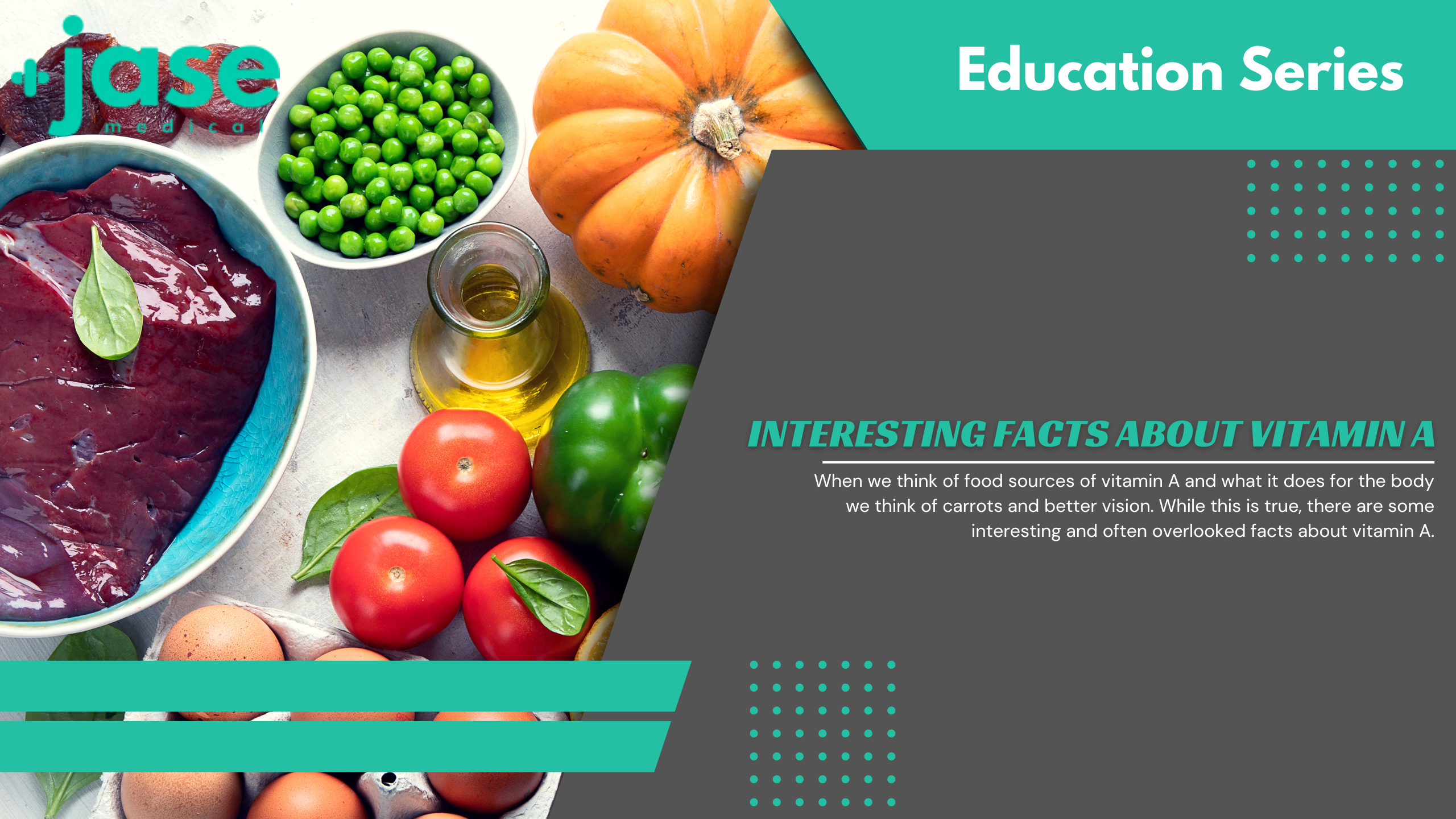If you’re considering Jase, chances are you’ve paused and thought, “This makes sense, but I still have a few questions.”You’re not alone. Here are the most common ones we hear, answered plainly. Is this really doctor-prescribed? Yes. Every Jase order is reviewed by a...
Interesting Facts About Vitamin A

When we think of food sources of vitamin A and what it does for the body we think of carrots and better vision. While this is true, there are some interesting and often overlooked facts about vitamin A.

What is vitamin A?
Vitamin A is a fat-soluble vitamin that is stored in the liver for up to 4 years. It is a subclass of retinoic acids, a family of lipid soluble compounds that includes retinols, beta carotenes and other carotenoids.
- The active form of vitamin A is called preformed retinol It is found in fish, organ meats, dairy products, egg yolks and some fortified foods.
- Provitamin A carotenoids are precursors to vitamin A. Foods containing carotenoids are converted through an enzymatic process into vitamin A. Carotenoids are a class of compounds yellow, orange, or red fat-soluble pigments, including carotene, which give color to plant parts such as ripe tomatoes and autumn leaves: There are more than 600 known carotenoids. Carotenoids are found in fruits, vegetables and some fish, such as in the pink color of salmon. It is also found in supplement form. One such carotenoid is beta-carotene.
- Beta-carotene converts to vitamin A and is an antioxidant. Antioxidants are manmade or natural substances that protect cells from damage caused by substances called free radicals. It is converted to retinol in the wall of the small intestine.
Vitamin A plays many important roles in health.
Preformed vitamin A – retinol is important for vision, especially night vision, anti inflammatory, enhances immune system function, important for developing fetal endothelial cell proliferation, produces pigments in retina, maintains healthy teeth, skeletal and soft tissue. In food form can be protective against some forms of cancer.
Vitamin A deficiency-
Vitamin A deficiency is considered to be rare except in premature infants, malnourished areas of the world, gastrointestinal disorders such as celiac, pancreatic insufficiency, bile duct disorder and those who cannot convert beta carotene to active vitamin A due to a BCMO1 gene variation– which results in a poor conversion from beta carotene to vitamin A. (It is estimated that approximately 45 percent of the population may have this conversion defect.
Symptoms of vitamin A deficiency:
- Night blindness
- Dry eyes
- Increased susceptibility to infection
- Bitot spots- a buildup of keratin in the eyes, causing hazy vision.
- Dry scaly skin
- Keratinisation. Cells become filled with keratin protein, die, and form tough, resistant structures in the urinary, gastrointestinal, and respiratory tracts.
- Cause of death after secondary bacterial infection of pneumonia after influenza
- Deficiency associated with the risk of recurrent respiratory tract infections in children and adolescents
- Deficiency linked to lung defects in developing fetus
Vitamin A toxicity
Most toxicity isa result of supplementation and not food sources.
Symptoms of vitamin A toxicity:
- drowsiness
- irritability
- abdominal pain
- nausea
- vomiting
- increased pressure on the brain
Supplementation
Seek advice of a qualified health professional before supplementing vitamin A or beta- carotene. Vitamin A is stored in the liver for up to four years so there is little chance of being deficient unless you have a pre existing condition that impairs vitamin A absorption or genetic impairment.
In addition, a large scale study called the ATBC study— over 29,000 smokers who supplemented with beta carotene (the precursor to vitamin A) was stopped abruptly because of the high incidence of lung cancer that developed during the study. The researchers concluded that all smokers should not use beta carotene supplements due to this increased risk of lung cancer.
Measles management in children
Excerpt from Infectious Diseases in Clinical Practice:
“In November 2019, the National Foundation for Infectious Diseases convened a summit that included multidisciplinary subject matter experts from across the United States to discuss the use of vitamin A in US measles management. The resulting Summit recommendations include that all children in the United States presenting with measles should receive an age-appropriate dose of vitamin A as part of a comprehensive measles management protocol. Multiple studies in populations in which vitamin A deficiency is prevalent have shown that this simple, quick means of improving vitamin A status can dramatically reduce the risk of serious complications and death from measles, with minimal detectable incidence of adverse effects.”
- Brooke Lounsbury, RN
Medical Content Writer
Lifesaving Medications
Recent Posts
Keeping you informed and safe.
FAQ: Our most commonly asked questions about Jase
Medical Readiness: What Really Kills First
When Disaster Strikes, It’s Not Hunger or Thirst That Takes the First Lives In every disaster zone, from hurricanes in the Caribbean to war zones in Ukraine, the pattern is the same. People worry about food and water, but it’s infection that kills first. A small wound...
Exploring Dr. William Makis’ Hybrid Orthomolecular Cancer Protocol: Focus on Ivermectin and Mebendazole/Fenbendazole
Exploring Dr. William Makis’ Hybrid Orthomolecular Cancer Protocol: Focus on Ivermectin and Mebendazole/Fenbendazole *Disclaimer: This article is for educational purposes and does not constitute medical advice. Always seek professional guidance.* In the evolving...





